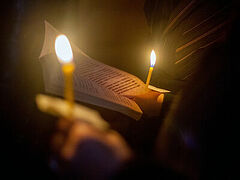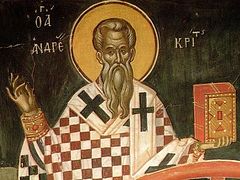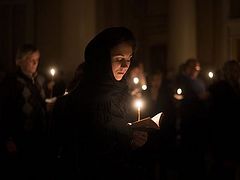The end draws near, O my soul, the end draws near; yet thou dost not prepare, neither dost thou care. The time grows short. Arise, for the Judge is at the very doors. The days of our lives pass quickly, as if they were a dream, as if they were a flower. O why do we trouble ourselves in vain? This is a poignant beginning to the Fourth Ode, and a synopsis of the vanity of our days, the fleeting hours and minutes and seconds of our lives which lead to the ultimate expiry date set for each one of us from the moment we enter this world: our personal death. I called to mind Thy prophet saying, I am but earth and ash! This hymn strikes me each time I sing it at a funeral, for where is king and solider, rich or beggar, righteous or sinner? Death is the great equalizer. We must take advantage of the time for the days are evil. It is for this reason that I appreciate the Great Canon, for it is a good reality check on the vanity of all things temporal—including my own, personal, biological existence.
I have wasted my time, St. Andrew continues to teach me. I have squandered the previous opportunities given to me by God in vain pursuits, on passions and sins. There is no sin I have not tasted, and no iniquity which did not snare me. I am not a true Israelite, like Jacob our father who worked for seven years to obtain the two wives, which are likened to praxis (action) and theoria (contemplation)—characteristics of the true Christian whose mind contemplates God. This is the meaning of the word “Israelite” according to St. Andrew. Like Esau, have we given away our birthright, our portion to the Kingdom? How have we done so? Like him, we have fallen into sexual lusts and vile temptations, and so we too receive name ‘Edom,’ which means the red-hot heat of a sin-loving soul.’ I have also not heeded the example provided me by the Prophet Job the Much-Suffering. I have avoided the steadfastness of Job, who, reduced from riches to poverty and illness, continued to bless the Lord, consistently remaining faithful.
Those who remain faithful are nourished by the Holy Sacraments, by Christ’s sacrifice on Golgotha, the breaking of His precious Body and shedding of His Blood, which occurred once and for all for the life of the world. If I do not repent, I will also not participate in the coming Kingdom which will be one, eternal Liturgy. St. Andrew raises the images from Christ’s parable of the Ten Virgins as a warning of my potential loss of the Kingdom: I am deprived of the bridal chamber and of the wedding feast because my lamp has gone out for want of oil; the chamber was closed while I was asleep, and the supper has been eaten; I am bound both hand and foot and now I am cast out. To be saved, I must stock up on oil (good deeds) within my lamp (soul). I must proceed to serve others wholeheartedly, sacrificially, steadfastly. I must also condemn certain things; I must condemn the vainglory and pride of the Publican and I must clothe my heart with the humility of the Pharisee. St. Andrew rightly diagnoses that man’s sin begins when man makes himself an idol. I must cast down the idols I have created which support my own, personal idol. These are the passions. I can begin by asking myself: is this temporal existence about myself alone? Should I not live for my Master and Benefactor, and all those whom He calls the least of these? How can I correct myself, how can I be saved? Only if He recalls me to spiritual awareness and sobriety, according to St. Andrew! So I must pray to receive the gift of repentance, for to know my place is a wonderful gift, which brings forth spiritual, mature fruit.
Ode Five
What is the life of a man? Our life, according to St. Andrew, is as a dark night. One strike, and death consumes and succeeds all! St. Andrew begins the Fifth Ode of his Great Canon with this analogy. I have spent this brief life trading in sin; like the brothers of Joseph of old, who sold the fruit of purity and chastity. Joseph will again arise as an image before our eyes on Holy Monday as a prefiguring of Christ, who though sold to death brought life and redemption by His sacrifice. Like Joseph, I must also resist the temptations of the flesh and sin and flee them, for all is temporal and fleeting; and every pleasure, I must remember, is comingled with sorrow. Sorrow follows pleasure. This is a fact I should never forget. Alienation from God brings sorrow, while faithfulness builds the tower of the soul, unshakeable and mighty. Like Moses, I must run to the desert to flee death-dealing sin and corruption. There, in a silent and mystical place of contemplation, will I meet God and receive the power of the Cross to divide—as did Moses when he made the sign of the Cross over the waters of the Red Sea—the sea of sin and thereby be raised to an incorruptible Resurrection, wherein I will be met by Christ with an eternal reward. These sentiments of deep faith are beautifully reflected in the following words within a prayer I personally love, composed by St. Patrick of Ireland: I await Resurrection to be met with reward.
Aaron offered to God a fire that was pure and undefiled, Hophni and Phineas brought to Him, as didst thou, O my soul, a strange sacrifice and a polluted life. I cannot honestly confess that I have offered much of a sacrifice proper and fitting to God: neither in words nor deeds or actions. I have sinned in all of these, and moreover, I have sinned via a plethora of opportunities in which I have failed to act righteously. That is, I have sinned with all that I have failed to do. I have sinned not in ignorance but consciously, with understanding. When the words, I am Thine, save me, I am Thine, for I have kept thy commandments, are chanted over my lifeless corpse. Behold! It will be far too late. For me the words, the hour is coming and now is near when the dead shall hear the voice of God, will ring true at that time. I will be far from all temporal things. I should obtain an irrevocable divorce from sin in the Sacrament of Confession without further delay. I should repent and resolve firmly to reject every soul-corrupting word and deed. Grant me understanding and adorn me, I should pray, grant me never to become a habitation of sin! Before I meet my mortal end and enter eternity, grant me fountains of tears. This should be my constant supplication. Before the priests come to take this poor sinner to the grave, make the garment of my flesh as white as snow.
Water is a powerful image here at the end of the Fifth Ode. The Spirit of the Lord was upon the waters, we read in Genesis in the Creation narrative. Water is the pivotal element in creation through which God creates and brings life. Water is a constant image of regeneration in the Old Testament; God brings the flood at Noah’s time to regenerate the sin-consumed world. Moses “baptizes” Israel in the sea, bringing them from death (Egypt) to life (Promised Land). Neman the Syrian is directed to baptize himself in the Jordan to be cleansed of leprosy. It is no surprise that Moses is mentioned by St. Andrew earlier in Ode Five, intimately connected to the Victory of the Cross. Like the Samaritan woman at the well, I could ask Christ to give me the well of living water, by which I will never thirst again. Have I sincerely thirsted for the Lord in this land untrodden and unwatered, this vain existence called my life? If I asked, I would have received. Not corruptible water but living water, water that grants eternal life. Water that quenches the deep thirst of man for intimacy and communion with God, with creation, and with his or her fellow man. I can fervently pray: Grant me the tears, O Savior, to wash my soul, mired by the passions, in the Pool of Siloam, which You established for me in this world—the Church and the Holy Sacraments found therein, wherein I the blind sinner can obtain my sight. Oh, if only I had the faith of the woman with the issue of blood mentioned by St. Andrew at the end of the Fifth Ode, who ran to Christ and touched Him in secret and heard the words: Woman, thy faith has saved thee! Vouchsafe us, Savior, to hear these words also!
Ode Six
The Sixth Ode of the Great Canon opens with the presentation of two characters not widely familiar to most: Dathan and Abiram. They were Hebrew siblings who consistently and methodically opposed Moses during the Exodus from Egypt. They brought no shortage of issues to Moses, attempting to dissuade Israel from following the Prophet to the Promised Land. They were consistent naysayers. How many of us are like these miserable wretches, idle complainers? How many oppose God’s will and impose their own will on his priests and believers? How many make unreasonable and egotistical demands, contrary to the spirit of the Gospel? We have not followed the New Moses (Christ) Who leads Israel (the Church) to the Promised Land (Paradise) from Egypt (the fallen world). St. Andrew thus prays, but the hand of Moses should touch us to cleanse us of our spiritual leprosy. Oh, what a blessing that would be! Crossing from death to life, I see the waves of the sea tossing round about me, I am taken and overwhelmed by sin which threatens to drown me and destroy my life: The waves of my sins, O Savior, have returned and have suddenly overwhelmed me, as the waters of the Red Sea engulfed the Egyptians of old and their charioteers. And yet, having passed to true life in the Church, to repentance and remission of sins, how many times have I, like Israel of old, become confused, bewildered, confounded? I have tasted of the glory of the Kingdom and deliverance and salvation in Christ; yet I, like Israel, wander in a desolate land, void of living water.
I alone am totally responsible. Thou hast preferred, O my soul, the wells of delusion to the cleft Rock from which, as from a chalice, flow rivers of divine theology. Thou hast preferred, O my soul, the meat of swine and the tempting food of Egypt to the food of Heaven, as did the ungrateful people of old in the wilderness. How many times have I preferred to quench my spiritual thirst with carnal desires and pleasures and lusts? How many times have I walked back on my vows before God? If I am married, have I been unremittingly faithful, consistently? If I am a monastic, have I kept my vows? If I am a cleric, have I served sacrificially? Well, if I am baptized—and we all have this in common, the One Baptism—then have I kept my Baptismal vows? Has my life been reflective of Christ’s life? Am I worthy of the name Christian? These pivotal and fundamental questions must be asked and answered between each one and the Lord our God in the secrecy of the heart and before the confessor at the Sacrament of Confession. No more, no less.
St. Andrew calls us to explore the mystery of the Church, to delve into the mystery of piety. The Church is the Promised Land; it is the fullest expression of the heavenly realities of the Age to Come in this shadow-of-a-world, as represented in our time, space, and reality. Like Joshua, the son of Nun, and explore the Promised Land, O my soul, and take up thine abode in it through obedience to the Law. Joshua, Moses’ successor, led Israel into the Promised Land, and in obedience to God’s law and supreme will, ensured Israel’s victory over pagan tribes such as the Amalekites. We are to act as Joshua did; we are to enter the Church and therein, by God’s help, receive via the Holy Sacraments the grace to slay the passions, sins, evil thoughts within the interior of the soul, exactly as Joshua did to the evil Amalekites. We are called to pass through the flowing waters of time. The unpredictable nature of time is that anything can occur at any moment. In the chaos of this life, I am to pause. I am to root myself in Christ and His supreme Will for my life. My life is totally committed to Him. Is it not? Did I not listen to the deacon and priest say, multiple times, Commit... ourselves and one another and all our life unto Christ our God? They said, commit ourselves AND one another. Do I care for my neighbor? Or am I constantly in the frame of mind that I will be saved alone, in my own vacuum? We are saved together or we perish together. One cannot drag anyone to Paradise, but, as Dostoyevsky expressed it, we are collectively responsible for the sins of all. Did we show the proper influence and intervention to our brethren when this was possible?
In the unpredictable, confusing times we live in revolving around COVID-19, when everyone is everyone’s enemy, and fear and uncertainty and controversy reign, with contradiction reigning within the Church on such topics such as masks and vaccinations, one Person is a constant certainty in our lives, a sure rock, a defender, a protector amidst the tribulations of this life: Christ. Pray then, with St. Andrew that He finds you, and me, and every good Christian soul. I am the coin marked with the royal image which was lost of old; but seek me by the light of Thy candle and Forerunner, and find again Thine Image, O my Savior. The chanters will pray similar words from the Psalms of David the Prophet King on your and my behalf when we depart this life: Seek Thy servant, for I have not forgotten Thy commandments!
The Kontakion: My Soul, My Soul
This hymn is perhaps the most familiar of all the hymns of the Lenten Fast!
My soul, my soul arise /
Why art thou sleeping? /
The end is drawing near /
And thou wilt be confounded. /
Awake then and be watchful /
That thou mayest be spared by Christ God ///
Who is everywhere present and fillest all things.
This hymn is a summary of the whole Great Canon; this hymn resounds with the eternal truths lauded within the Canon. Why do we slumber? Why are we negligent? Do we not really understand that the credits of our life will soon roll as credits roll at the end of a movie? The years are passing by in vanity. Why is a man troubled with worldly cares, luxuries, status, or power, when all things are fleeting shadows? The soul must be aroused not by an intellectual call to repentance—i.e., a moralistic or academic understanding. That is not of much help. Indeed, many have an intrinsic knowledge that smoking causes death, yet they continue to smoke. And many understand that their passions and sins are killing the interior man, yet they continue. Why is this so? This is so because the heart is deadened, the heart has succumbed to a condition known in Greek as πόροσις. The pores of the heart are blocked by sin and the passions, and grace can in no manner enter. This is a deadly state. It precedes the death of the soul, and one’s salvation in this condition is seriously questionable! If you have any desire to repent, you are not at this stage—yet. It is pivotally important that, despite whatever sins or shortcomings overcome you, you get up, you repent. Know that Christ is watching you, He is everywhere present, He fills all things, He is ready to be Friend, Bridegroom, and Savior. Internalize the words of this penitential Kontakion composed by St. Andrew. Say: Savior and Master Christ, You know all my sins, spare me in Your mercy and love! Help me, lift me, inspire me, lead me, purify me, sanctify me! The Savior is kind and generous, He sees the intention, and honors the desire. Let us never forget this crucial fact!




